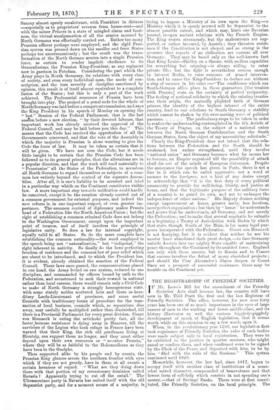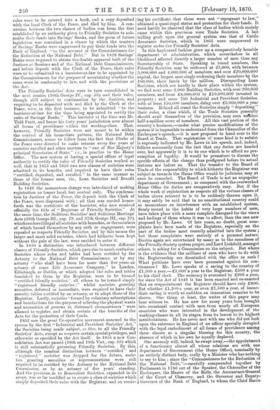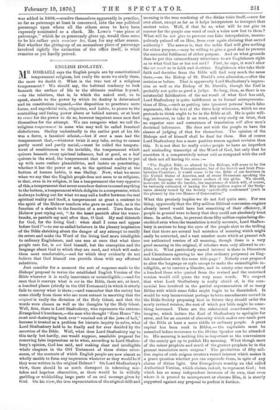THE REGISTRARSHIP OF FRIENDLY SOCIETIES.
TF Mr. Lowe's Bill for the amendment of the Friendly Societies' Acts shall become law, the country will have seen in Mr. Tidd Pratt the first and the last Registrar of Friendly Societies. The office, however, for now over forty years has been one of so much importance in the eyes of large masses of men in the working and lower middle-class, and its history illustrates so well the curious higgledy-piggledy development of much of English legislation, that it seems worth while on this occasion to say a few words upon it.
When, in the revolutionary year 1793, our legislation first took cognizance of Friendly Societies, the rules of such bodies were made subject only to local registration. They were to be exhibited to the justices in quarter sessions, who might annul or confirm them, and when confirmed were to be signed by the Clerk of the Peace, and deposited with him, to be by him "filed with the rolls of the Sessions." This system continued until 1829.
Meanwhile, however, the law had, since 1817, begun to occupy itself with another class of institutions of a some- what mixed character, compounded of benevolence and that lowest form of self-help which consists in not spending one's money,—that of Savings' Banks. These were at first consti- tuted, like Friendly Societies, on the local principle. The
rules were to be entered into a book, and a copy deposited with the local Clerk of the Peace, and filed by him. A con- nection between the two classes of bodies was from the first established by an authority given to Friendly Societies to sub- scribe their funds into Savings' Banks, and the germ of future legislation was contained in a clause by which the trustees of Savings' Banks were empowered to pay their funds into the Bank of England, "to the account of the Commissioners for the Reduction of the National Debt." But in 1828 Savings' Banks were required to obtain the double approval both of the Justices at Sessions and of the National Debt Commissioners, and before deposit with the Clerk of the Peace, their rules were to be submitted to a barrister-at-law to be appointed by the Commissioners, for the purpose of ascertaining whether the same were in conformity to law, and with the provisions of the Act.
The Friendly Societies' Acts were in turn consolidated in the next session (10th George IV., cap. 56), and their rules, though still subject to confirmation by the Justices, and requiring to be deposited with and filed by the Clerk of the Peace, were, in the first instance, to be submitted "to the barrister-at-law for the time being appointed to certify the rules of Savings' Banks." This barrister at the time was Mr. Tidd Pratt, and hence his forty years' jurisdiction over almost all forms of providence within the working-class. That, however, Friendly Societies were not meant to be within the control of his immediate patrons, the National Debt Commissioners, seems to follow from the fact that Clerks of the Peace were directed to make returns every five years of societies enrolled and other matters to "one of Her Majesty's principal Secretaries of State," i.e., in practice to the Home Office. The new system of having a special officer of legal authority to certify the rules of Friendly Societies worked so well, that in 1835 and 1836 two new classes of societies were admitted to its benefits, and required to have their rules "certified, deposited, and enrolled," in the same manner as those of the former ones, viz., Loan Societies and Benefit Building Societies.
In 1846 the momentous change was introduced of making registration no longer local, but central only. The confirma- tion by Justices of the Peace, the deposit with the Clerk of the Peace, were dispensed with ; all that was needed hence- forth was the certificate of the barrister, who now received officially the title of "Registrar of Friendly Societies." At the same time, the Seditious Societies' and Seditious Meetings' Acts (39th George III., cap. 79, and 37th George III., cap. 19), which rendered illegal all societies with branches, or the members of which bound themselves by any oath or engagement, were repealed as respects Friendly Societies, and by this means the larger and more solid societies, which had hitherto been kept without the pale of the law, were enabled to enter it.
In 1850 a distinction was introduced between different .classes of Friendly Societies, which gave rise to much confusion. Societies whose rules and tables had been certified by the Actuary to the National Debt Commissioners, or by any actuary "who shall have been for more than five years an actuary of some Life Assurance Company," in London, Edinburgh, or Dublin, or which adopted the rules and tables furnished to them by the Registrar, were to be termed "certified friendly societies," all others to be termed simply "registered friendly societies ;" whilst societies granting annuities, deferred or immediate, were required to have their annuity tables certified by an actuary, or to adopt those of the Registrar. Lastly, societies "formed by voluntary subscriptions and benefactions for the purpose of relieving the physical wants and necessities of persons in distressed circumstances" were allowed to register, and obtain certain of the benefits of the Acts for the protection of their funds.
1852 saw the great Co-operative movement annexed to the system by the first "Industrial and Provident Societies' Act," the Societies being made subject, en bloc, to all the Friendly Societies' Acts, except as respects certain special privileges, and otherwise as specified by the Act itself. In 1855 a new Con- solidation Act was passed (18th and 19th Viet., cap. 63) which is still substantially governing Friendly Societies. By this, although the nominal distinction between " certified " and " registered " societies was dropped for the future, socie- ties granting annuities or superannuations were still required to be certified by the Actuary to the National Debt Commission, or by an actuary of five years' standing. And the provision as to Benevolent Societies, expanded in its scope, was so far modified as to create a class of societies which simply deposited their rules with the Registrar, and on receiv-
ing his certificate that these were not "repugnant to law," obtained a quasi-legal status and protection for their funds. It need hardly be observed that the class of bodies which mainly came within this provision were Trade Societies. A last trifling graft upon the general system was that of Cattle Assurance Societies, which in 1866 were empowered to register under the Friendly Societies' Acts.
In this haphazard fashion grew up a comparatively humble department of administration, which nevertheless in all likelihood affected directly a larger number of men than any Secretaryship of State. Speaking in round numbers, the Friendly Societies may be reckoned at 25,000, with between 3,000,000 and 4,000,000 of members, and over £20,000,000 capital, the largest ones singly reckoning their members by the 100,000, their funds by the million. Disregarding Loan Societies, which are hardly in their place within the system, we find next some 2,000 Building Societies, with over 200,000 members, and from £8,000,000 to £10,000,000 invested in property ; and some 700 Industrial and Provident Societies, with at least 150,000 members, doing over £3,000,000 a year business. Behind all stand the Societies simply " depositing " their rules, a class which, if the Trade Societies generally should avail themselves of the provision, may soon nutaber half-a-million more of members. All this vast portion of the country's business,—under what precise modifications of the system it is impossible to understand from the Chancellor of the Exchequer's speech,—it is now proposed to hand over to the Board of Trade. That registration of some kind is to subsist is expressly indicated by Mr. Lowe in his speech, and, indeed, follows necessarily from the fact that any duties are handed over, but apparently it is to be one which is to afford no pre- sumption of legality. It would be premature to discuss the specific effects of the change thus prefigured before its actual features are before us. That the transfer to the Board of Trade of the responsibility to which hitherto the Registrar was subject as towards the Home Office would be judicious, may at once be conceded. The Board of Trade is not an unpopular department of Government ; as compared with the overworked Home Office its duties are comparatively easy. But if the whole work of registration as respects all the various classes of bodies above referred to is to be suddenly thrown upon it, it may safely be said that in no constitutional country could so momentous an interference with an established system, firmly rooted in the habits of very large numbers of men, have taken place with a more complete disregard for the views and feelings of those whom it was to affect, than the one now proposed by Mr. Lowe. Of late years, no doubt, great com- plaints have been made of the Registrar, especially on the part of the bodies most recently admitted into the system ; but those complaints were entirely of a personal nature. Doubts again are entertained by many as to the soundness of the Friendly-Society system proper, and Lord Lichfield, amongst others, is asking for a Commission on the subject. But where is the evidence that the millions of men who have to do with the Registrarship are dissatisfied with the office as such ? What petitions have ever been presented against its con- tinuance? Mr. Lowe speaks of a saving to the country of £1,500 a year,—£1,000 a year to the Registrar, £500 a year to his chief clerk. The economy is overrated by £200 a year, for since the Act of 1846 it has been enacted and re-enacted that on reappointment the Registrar should have only £800. But whether £1,300 a year, or even £1,500 a year, of imme- diate saving is worth so suddden an innovation remains to be shown. One thing, at least, the writer of this paper may bear witness to. He has now for many years been brought into occasional contact with men from nearly all European countries who were interested in the development of the working-classes in all its stages, from its lowest to its highest manifestations. He has never met with one who did not look upon the existence in England of an officer specially Occupied with the legal embodiment of all forms of providence among those classes as a singular blessing for this country, the absence of which in his own he equally deplored.
One anomaly will, indeed, be swept away,—the appointment of a functionary almost all whose relations are with one department of Government (the Home Office), nominally by an entirely distinct body, really by a Minister who has nothing to say to him ; since the "Commissioners for the Reduction of the National Debt,"—carefully compounded together by Parliament in 1786 out of the Speaker, the Chancellor of the Exchequer, the Master of the Rolls, the Accountant-General of the Court of Chancery, and the Governor and Deputy- Governor of the Bank of England, to whom the Chief Baron was added in 1808,—resolve themselves apparently in practice, so far as patronage at least is concerned, into the one political personage upon whom all the others seem to have been expressly nominated as a check. Mr. Lowe's "one piece of patronage," which he so generously gives up, would thus seem to be his rather quia nominor leo, than for any other reason. But whether the giving-up of an anomalous piece of patronage involved rightly the extinction of the office itself, is what remains as yet hardly proved.


































 Previous page
Previous page